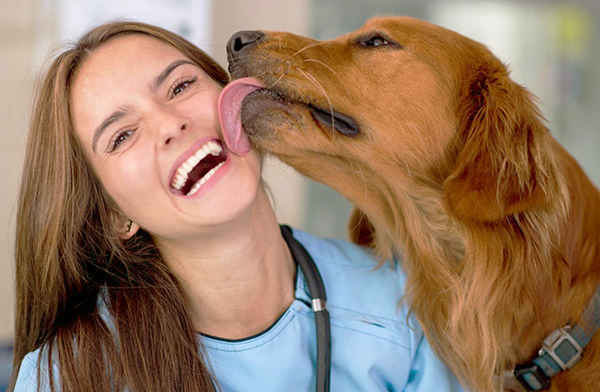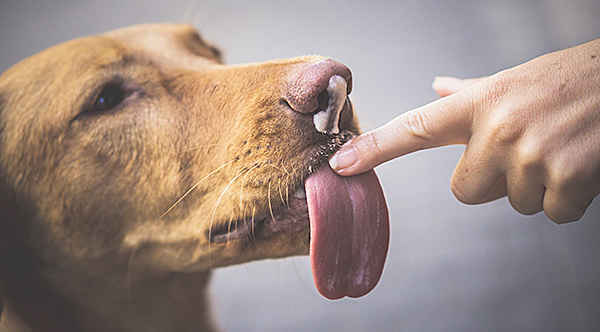Why does my dog lick me so much?
Dogs lick their owners for various reasons, and it’s typically a combination of instinctual behavior and social cues.

Here are some reasons why your dog might be licking you excessively:
Affection and Bonding
Licking is a natural way for dogs to show affection and strengthen their bond with their human companions. When your dog licks you, they may be expressing their love and desire for closeness.
Communication
Dogs use licking as a form of communication. It can signal submission, respect, or a desire for attention. By licking you, your dog may be trying to convey a message or seek interaction.
Taste and Smell
Your skin might have residual smells or tastes that your dog finds appealing, sweat or remnants of food. Dogs have an incredibly keen sense of smell, and they may lick you simply because they like the way you taste.
Grooming Behavior
Licking is a natural grooming behavior for dogs. In the wild, pack members groom each other as a way to maintain social bonds and cleanliness. Your dog may view you as a member of their pack and engage in licking as a grooming ritual.
Anxiety or Stress
In some cases, excessive licking can be a sign of anxiety or stress in dogs. If your dog is feeling anxious or insecure, they may lick compulsively as a way to self-soothe. It’s essential to observe your dog’s overall behavior and environment to determine if stress could be a contributing factor.
Medical Issues
Certain medical conditions, allergies, skin irritations, or digestive problems, can cause dogs to lick excessively. If you notice persistent licking accompanied by other symptoms like redness, swelling, or changes in appetite, it’s crucial to consult with your veterinarian to rule out any underlying health issues.
One fascinating aspect of this behavior is that it’s deeply ingrained in a dog’s evolutionary history. Wolves, the ancestors of domestic dogs, lick pack members to reinforce social bonds and maintain harmony within the group. This instinctual behavior has carried over to our modern-day canine companions, shaping the way they interact with humans.
So, the next time your dog showers you with slobbery kisses, remember that it’s their way of expressing love, communicating, and connecting with you as part of their pack.
Dog drool is dangerous to humans?
Generally, dog drool itself is not inherently dangerous to humans.

However, there are a few considerations to keep in mind:
Bacteria and Germs:
Like any bodily fluid, dog saliva can contain bacteria and germs. While most of these are harmless to humans, there is a slight risk of transmission of certain bacteria that can cause infections. This risk is typically minimal, especially if you have a healthy immune system.
Allergies:
Some people may be allergic to proteins found in dog saliva. In such cases, contact with dog drool can trigger allergic reactions, ranging from mild irritation to more severe symptoms like itching, swelling, or difficulty breathing.
Zoonotic Diseases:
While rare, some zoonotic diseases (illnesses that can be transmitted from animals to humans) can potentially be spread through contact with dog saliva. Examples include leptospirosis and salmonellosis. However, the risk of contracting these diseases from dog drool is generally low, especially with proper hygiene practices and regular veterinary care for your pet.
Personal Hygiene:
Practicing good hygiene habits, washing your hands after handling your dog or coming into contact with their saliva, can help reduce any potential health risks.
In most cases, interacting with your dog’s drool poses little to no danger to your health. However, it’s essential to be aware of any potential risks, especially for individuals with allergies or compromised immune systems, and to take appropriate precautions to minimize them.
Regular veterinary check-ups, maintaining your dog’s oral hygiene, and practicing good personal hygiene can help ensure a safe and enjoyable relationship between you and your furry friend.












